Related Research Articles

Thomas Ruggles Pynchon Jr. is an American novelist noted for his dense and complex novels. His fiction and non-fiction writings encompass a vast array of subject matter, genres and themes, including history, music, science, and mathematics. For Gravity's Rainbow, Pynchon won the 1973 U.S. National Book Award for Fiction.
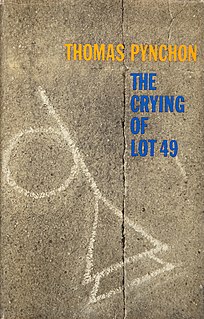
The Crying of Lot 49 is a 1966 novel by American author Thomas Pynchon. The shortest of Pynchon's novels, the plot follows Oedipa Maas, a young Californian woman who begins to embrace a conspiracy theory as she possibly unearths a centuries-old feud between two mail distribution companies; one of these companies, Thurn and Taxis, actually existed (1806–1867) and was the first private firm to distribute postal mail. Like most of Pynchon's output, Lot 49 is often described as postmodernist literature. Time included the novel in its "TIME 100 Best English-Language Novels from 1923 to 2005".
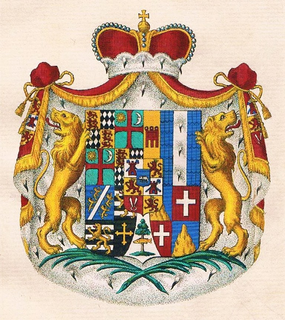
The Princely House of Thurn and Taxis is a family of German nobility that is part of the Briefadel. It was a key player in the postal services in Europe during the 16th century, until the end of the Holy Roman Empire in 1806, and became well known as the owner of breweries and builder of many castles. The current head of the house is Albert, 12th Prince of Thurn and Taxis. The family is one of the wealthiest in Germany and has resided at St. Emmeram Castle in Regensburg since 1748.

Bergamo is a city in the alpine Lombardy region of northern Italy, approximately 40 km (25 mi) northeast of Milan, and about 30 km (19 mi) from Switzerland, the alpine lakes Como and Iseo and 70 km (43 mi) from Garda and Maggiore. The Bergamo Alps begin immediately north of the city.

Orio al Serio International Airport, the third busiest international airport in Italy, is in Orio al Serio, 3.7 km (2.3 mi) southeast of Bergamo and 45 km (28 mi) north-east of Milan, where it operates alongside Malpensa Airport and Linate Airport, the city's other two primary airports. The airport served almost 13 million passengers in 2018.
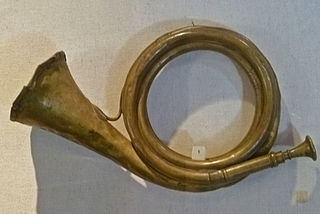
The post horn is a valveless cylindrical brass instrument with a cupped mouthpiece. The instrument was used to signal the arrival or departure of a post rider or mail coach. It was used especially by postilions of the 18th and 19th centuries.
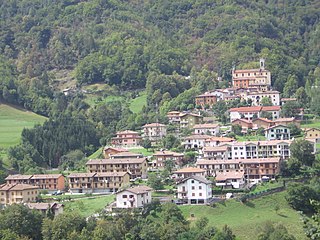
Camerata Cornello is a comune (municipality) in the Province of Bergamo in the Italian region of Lombardy, located about 60 km (37 mi) northeast of Milan and about 20 km (12 mi) north of Bergamo.

Zanica is a comune (municipality) of around 8,804 inhabitants in the Province of Bergamo in the Italian region of Lombardy, located about 45 kilometres (28 mi) northeast of Milan and 7 kilometres (4 mi) south of Bergamo. Zanica borders the following municipalities: Azzano San Paolo, Cavernago, Comun Nuovo, Grassobbio, Orio al Serio, Stezzano, Urgnano.
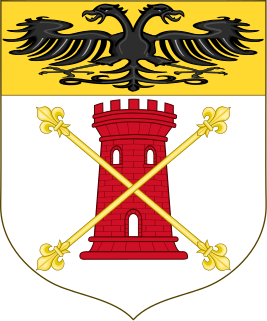
The House of Della Torre were an Italian noble family who rose to prominence in Lombardy during the 12th–14th centuries, until they held the lordship of Milan before being ousted by the Visconti.

Anselm Franz, 2nd Prince of Thurn and Taxis, full German name: Anselm Franz Fürst von Thurn und Taxis was the second Prince of Thurn and Taxis, Postmaster General of the Imperial Reichspost, and Head of the House of Thurn and Taxis from 21 February 1714 until his death on 8 November 1739.

Prince Alessandro della Torre e Tasso, 1st Duke of Castel Duino, full German name: Alexander Karl Egon Theobald Lamoral Johann Baptist Maria, Prinz von Thurn und Taxis was a member of the Bohemian branch of the princely House of Thurn and Taxis. Alessandro was created Prince della Torre e Tasso and first Duke of Castel Duino by Victor Emmanuel III of Italy after relocating to the Kingdom of Italy in 1923.

I Borghi più belli d'Italia is an association of small Italian towns of historical interest, that was founded in March 2001 on the initiative of the Tourism Council of the Associazione Nazionale Comuni Italiani, with the aim of preserving and maintaining villages of quality heritage. The association holds initiatives such as festivals, exhibitions, fetes, conferences and concerts that highlight the cultural, historical, gastronomic and linguistic heritage, involving residents, schools, and local artists.
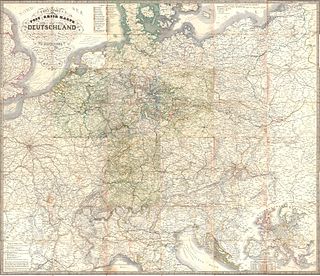
The Thurn-und-Taxis Post was a private postal service and the successor to the Imperial Reichspost of the Holy Roman Empire. The Thurn-und-Taxis Post was operated by the Princely House of Thurn and Taxis between 1806 and 1867. The company was headquartered in Regensburg from its creation in 1806 until 1810 when it relocated to Frankfurt am Main where it remained until 1867.

Treviglio railway station, also known as Treviglio centrale railway station is the main station serving the town and comune of Treviglio, in the region of Lombardy, northern Italy. Opened in 1878, it has a higher average number of passengers per day than Treviglio's other railway station, Treviglio Ovest.

Lamoral II Claudius Franz, Count of Thurn and Taxis was a German nobleman and Imperial Postmaster. He took over the post of Imperial Postmaster General from his mother when he came of age in 1646. He obtained permission from the Emperor in 1650 to change his family name to von Thurn, Valsassina und Taxis, but then opted for the shorter von Thurn und Taxis. He and his mother were instrumental in the organization of the Imperial postal system. After the end of the Thirty Years' War, he successfully competed against the many postal systems of the German states. He was, however, unable to regain a legal monopoly. He also participated in the negotiations that led to the Treaty of Westphalia.
Francesco Maria Tassi was an Italian art historian whose book, Lives of the Painters, Sculptors, and Architects of Bergamo, published posthumously in 1793, provided important biographical information on artists such as Lorenzo Lotto, Fra Galgario, Giovanni Battista Tiepolo, and Francesco Zuccarelli. His account of contemporaries was often enlivened by first-hand knowledge, for example with Tiepolo and Zuccarelli, who at times visited Tassi at the family estate of Villa dei Tasso alla Celadina, in Bergamo. Tassi also edited a compilation of writings by Benvenuto Cellini which appeared in print in 1829.

The hôtel de Villeroy, also the hôtel de Villeroy Bourbon or hôtel de la Poste, is a hôtel particulier, a type of large townhouse of France, at 34 rue des Bourdonnais, 9 rue des Déchargeurs, 17 rue des Halles in the 1st arrondissement of Paris. It is a designated monument historique.

Kaiserliche Reichspost, originally named Niederländische Postkurs, was the name of the international postal service of the Holy Roman Empire, founded in 1490.
Giuseppe Biagi is an Italian painter and member of the Metacosa Movement.
Jacques de Taxi was ad interim Grand Master of the Knights Hospitaller, serving in 1285 and was the successor to Nicolas Lorgne. De Taxi was appointed as acting leader of the Order prior to the arrival of Jean de Villiers in the Holy Land.
References
- Tarcisio Bottani (2002). Tasso del Bretto. I documenti tassiani dell'Istituto Sacra Famiglia di Comonte (in Italian). Corponove Bergamo. ISBN 9788887831184.